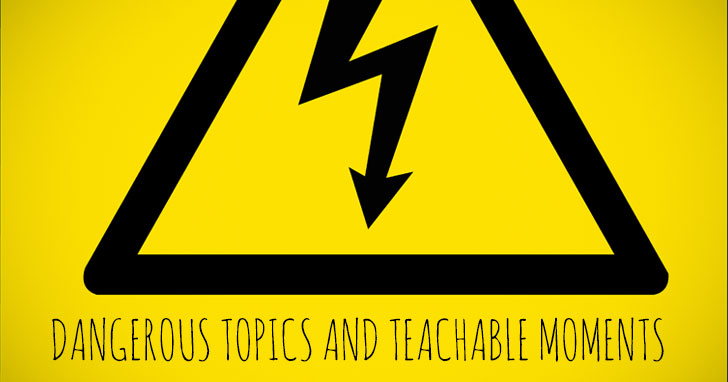Navigating Difficult Issues: Avoiding Pitfalls While Moving Forward


The topic is too “dangerous” for a number of reasons: it is too controversial, at the more global or at the local level; it is highly charged emotionally; it challenges deeply held political, philosophical, or religious beliefs. Indeed, such topics are uncomfortable to discuss. They may cause conflict in the classroom or in the community at large. Should they then be left untouched? No. There are number of reasons to engage with them.

The “cat is then out of the bag.”In a “controversy” a number of years ago in California, a mother actually threatened legal action against the kindergarten teacher who robbed from the mother her role in informing the child that Santa Claus didn’t exist.
Well, the child had asked, apparently. The parent, livid, said “Thank God he didn’t believe her.” Well, again, he asked…maybe he asked the teacher because the mom was apparently unwilling to let go of the shared illusion? However, it really isn’t a teacher’s job to hand out misinformation, and if a student asks a straightforward question, he’s entitled to an honest response. As necessary, the response can be mitigated with polite or sensitive language to soften the blow that maybe there is no such individual, literally, as Santa Claus, but his spirit lives in all who give freely.
More serious topics occupy students at older ages (small children, small problems; big children, big problems). Sometimes they raise an issue and are so clearly misinformed on it that the teacher should speak up. Two students in my middle school classroom a number of years ago were discussing the TV series “Saturday Night Live,” a late-night music and comedy show that has sometimes strong language and risqué humor. The students had learned, or half-learned, the terms “heterosexual” and “homosexual” from the show, and were discussing these terms at break. The students were, however, clearly misinformed on the terms’ meanings, so I clarified them. Their parents complained—but, well, I wasn’t the one who let them stay up and watch Saturday Night Live. Again, one of a teacher’s main jobs is to correct misinformation or fill in information gaps.
It is then an imperative to raise awareness.Topics regarding immigration, gun ownership, and hate crimes, for example, affect all of us in various ways. These issues are important to be educated on because they affect the community as a whole. Even topics as seemingly innocuous as Halloween can be deeply offensive to some people because of their religious convictions—Halloween is associated with the devil in some religious traditions. However, it is still important to be informed about the practice of Halloween in the U.S. for safety purposes if no other (watching out for bands of children roaming the streets at night and keeping your pets inside to avoid abuse are two main precautions.) Because something is offensive to some individuals and they doesn’t want to discuss it doesn’t mean the issue will go away.
Human trafficking, apartheid, ethnic cleansing…uncomfortable topics, which is why we should discuss them. No one else will, outside the classroom. They are not topics for dinner table conversation, but they do need to be discussed, and the classroom is where that should take place, a place where students should feel free to express opinions without being judged.
The topic of evolution and its teaching is, surprisingly, still something of a controversy in the United States because it does conflict with traditional religious beliefs on the creation of the universe. So much of the evidence supports the theory of evolution that really it can’t just dismissed, and there is some responsibility to educate on this issue, especially as it relates to the class curriculum. I would have a hard time, for example, teaching a class in Introduction to Linguistics without mentioning the evolutionary basis for language in humans. Ignoring this critical topic because it may upset some students is to neglect the topic.
Part of an education is to be led out of your comfort zone and to hear ideas new, radical even, and perhaps uncomfortable. Education must go beyond merely reaffirming and validating what is already known.

When the topic is raised, the teacher should consider if this is a “teachable moment.” That is, the discussion of a recent riot in another part of the country may not be the focus of the planned instruction today, but often the topic should be addressed in any case and perhaps supersedes the planned instruction. The students’ willingness to engage in the topic should also be taken into consideration. If students simply have no interest on a recent piece of legislation, for example, and especially if it does not directly impact students’ lives, it may not be worth spending time on.
If a decision has been made to go ahead with the discussion, the instructor should ask students what they know already about the topic. This information can be used to clarify any misconceptions or gaps in basic terminology or misinformation. One piece of misinformation I found students held recently was the nature of the “Good Samaritan Law,” which is simply legal protection offered to those who in good faith offered help to someone in distress or in an emergency situation. Some students held the belief that this law requires people to stop and help those in distress, which it does not. Clarification of basic misunderstandings like this is needed before any discussion on the topic can take place.
The instructor should then lay out some of the basic controversy, giving attention to both sides: e.g., why some people support and others oppose the death penalty, being careful at first to withhold her own stance on the matter while students explore their own ideas.
It is then, with some basic information on the topic and its issues that some serious discussion of the topic can take place.
Essentially, teachers who don’t raise issues or dismiss them because they are too uncomfortable, too radical, or too offensive, even, may be neglecting part of their jobs. Education is by nature uncomfortable: it requires you to leave behind a comfort zone, entertain new ideas, and practice discussing new information and skills. Productive discussion can take place if taught well, even on, or especially on, “controversial topics.”